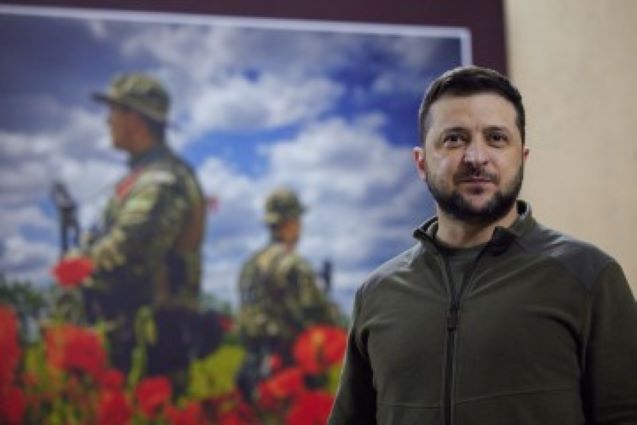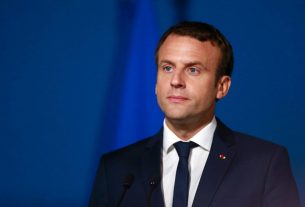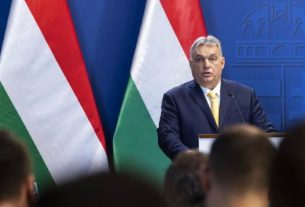Kyiv, Ukraine — Ukraine’s top military expert has said that Kyiv has to make a “strategic, principal decision” on how to benefit from the unfolding turmoil in Russia.
One such move could be an order to invade western Russia to bypass massive defence installations on the 1,000-kilometre-long (620-mile-long) front line in eastern and southern Ukraine, according to Lieutenant General Ihor Romanenko.
“Those who make unorthodox decisions and implement them will succeed,” the former deputy chief of Ukraine’s general staff of armed forces told Al Jazeera, adding that it was time to strike Russian forces in the back.
Such a plan looked like a “fairy tale” just a day ago, but the panic and disarray in Russia as troops of the Wagner private military contractor march on Moscow may provide Kyiv with a perfect opportunity to deliver the least expected blow, he said.
Ukraine’s Western backers will, however, inevitably step in to dissuade Kyiv from such decisions to avoid Moscow’s use of nuclear weapons, Romanenko added.
“Of course, our allies will meddle, will try to influence it somehow, in the ‘let’s-not-let-something-bad-happen’ way, to avoid escalation, the use of the weapons of mass destruction,” he said.
Breaching western Russia
The path to western Russia has already been paved.
The Russian Volunteer Corps (RVC), a group of fugitive Russian ultra-nationalists fighting for Ukraine, has conducted three incursions into western Russian regions.
They were backed by former Russian war prisoners who fight for Ukraine, as well as by volunteers from neighbouring Poland and Belarus.
On June 1, they crossed into the western Russian region of Belgorod to attack Shebekino, a city of 40,000, and seize the village of Novaya Tavolzhanka.
Tens of thousands of civilians fled Belgorod, and Novaya Tavolzhanka became Russia’s first area beyond Moscow’s control.
On Saturday, RVC head urged its supporters to “get ready”.
The group’s head, Denis Nikitin, wrote on RVC’s Telegram channel that Wagner chief Yevgeny Prigozhin emerged from the “processes of rot and decay” in Russia.
“And what we have is an ambitious patriot, popular among people and servicemen, who has his own private army; the population demoralised by the prolonged bloody war and an incoherent government. Let’s get ready!” Nikitin wrote.
‘Russia’s weakness is obvious’
While the top brass in Kyiv distanced themselves from the RVC’s incursions, Prigozhin’s rebellion caught them by surprise.
Ukrainian President Volodymyr Zelenskyy said, “Russia’s weakness is obvious” and that the longer Moscow keeps its troops and mercenaries in Ukraine, the more chaos it would invite back home.
“And the longer Russia keeps its troops and mercenaries on our land, the more chaos, pain and problems it will have for itself later,” Zelenskyy wrote.
Mykhailo Podolyak, an adviser to Zelenskyy, tweeted, “The next 48 hours will define the new status of Russia. Either a full-fledged Civil War, or a negotiated Transit of Power, or a temporary respite before the next phase of the downfall of the Putin regime.”
“All potential players are now choosing which side they are on. A deafening ‘elite’ silence is in Russia so far,” he wrote.
Meanwhile, Ukraine’s foreign minister said the international community should “abandon false neutrality” on Russia and provide Kyiv with all the weapons it needs to push Moscow’s forces out of Ukrainian territory.
“Those who said Russia was too strong to lose: look now,” Dmytro Kuleba tweeted. “Time to abandon false neutrality and fear of escalation; give Ukraine all the needed weapons; forget about friendship or business with Russia.”
“Time to put an end to the evil everyone despised but was too afraid to tear down.”
Will history repeat itself?
Russia has already experienced a war that turned into a quagmire and showed how disorganised, demoralised and badly supplied the army was. Squads of servicemen rioted and marched home, triggering popular unrest and the government’s fall, a bloody civil war and the emergence of a totalitarian dictatorship.
This is not a prediction of what may or may not happen in Russia next, but it is what took place more than a century ago, when dispirited tsarist troops left the World War I front lines to flock back to Russia. Tsar Nicholas II abdicated in 1917 after the Bolshevik Revolution, which paved the way for the Communist takeover.
Russian President Vladimir Putin recalled the fear of “another 1917” in his national address on Saturday.
His Ukrainian counterpart also referred to the fateful year.
Putin “again and again scares [Russians] with another 1917, but he can’t lead it to anything else,” Zelenskyy tweeted.
“Ukraine is able to protect Europe from the spread of Russian evil and chaos. We keep our strength, unity and strength. All our commanders, all our soldiers know what to do,” Zelenskyy wrote.
‘Ukraine will suffer greatly’
Average Ukrainians were far less optimistic about Russia’s possible disintegration as it may trigger the exodus of millions of refugees and the use of nuclear weapons.
“This is happening again, and Ukraine will suffer greatly,” Andriy Lokshin, who serves in the “territorial defence” volunteer militia in Kyiv, told Al Jazeera.
“We don’t need another Wedding in Malinovka,” he said, referring to the 1967 musical describing life in a Ukrainian village during the 1918-20 civil war in the former Russian empire.
Other Ukrainians responded with schadenfreude and said that Putin’s plans of a blitzkrieg in Ukraine backfired.
“They wanted to take Kyiv in three days, but got Rostov-on-Don in one,” Halyna Kerzhenets, who sells souvenirs in central Kyiv, told Al Jazeera, referring to the southwestern Russian city Prigozhin seized early on Saturday.
Predictably, memes and jokes about the mutiny have been going viral.
One of them ridiculed the Russian Ministry of Defence’s exaggerations while reporting Ukraine’s battlefield losses.
“250,000 Wagner fighters were killed, 25,000 tanks destroyed, and three Prigozhins taken prisoner,” it read.
Yet, observers saw the unfolding developments as a replay of the “Times of Trouble” that followed the death of Russian Tsar Ivan the Terrible more than four centuries ago.
“Almost a reincarnation of the algorithm of Ivan the Terrible’s era, but in the mode of condensed historic time,” Kyiv-based analyst Aleksey Kushch told Al Jazeera.
The notoriously cruel tsar was succeeded by his mentally challenged, childless son and two noblemen, as Russian nobles consolidated power and Poland tried to install its own candidates, including two “false” sons of Ivan the Terrible.
“According to the genre’s laws, there must be an emergence of the oligarchic ‘seven noblemen’ and false-Putins, for the real Putin has enough doubles,” Kushch said.__Al Jazeera





